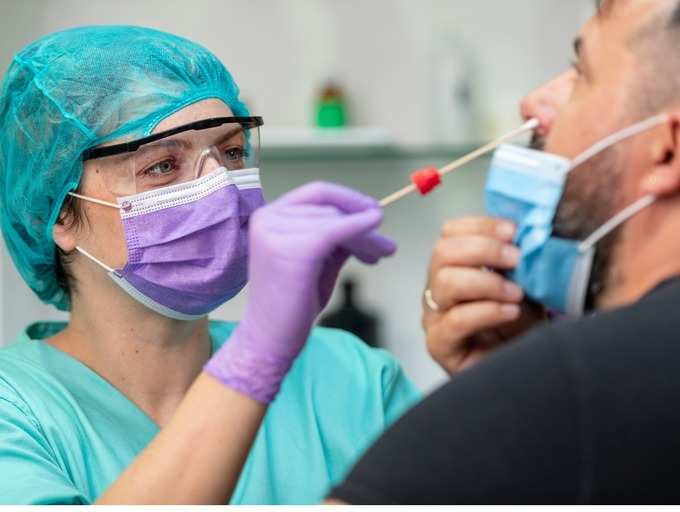Manas Dasgupta
NEW DELH, Nov 22: Even as India is apprehending a second wave of Coronavirus in the coming winter months and sending special central teams to various seriously-hit states for controlling the situation, the Parliamentary Standing Committee on Health and Family Welfare has questioned the central government’s handling of the pandemic at the initial stages and even now.
The Committee headed by the Samajwadi Party member of the Rajya Sabha Ram Gopal Yadav, submitted its report to the vice president Venkaiah Naidu on Saturday red-flagging both the “slow testing and poor contact tracing” in the initial days and the present Rapid Antigen Tests (RAT) to show low percentage of positive cases in comparison to the tests being undertaken.
The report while appreciating early lockdown that, it felt, had saved lives, said India’s slow testing and poor contact tracing in the initial days of the Covid-19 pandemic led to the exponential growth of cases in the country. It also said the committee was “worried at the use of less reliable diagnostic tests (RAT) which increase the chances of false negatives,” and expressed concern that even the specialised cadre whose mandate was to respond to outbreaks remained under-utilised.
It said the current overreliance on the “less-reliable” antigen tests could derail the fight against the SARS-CoV2 virus.
“The Committee believes that poor contact tracing and less testing could have been a factor for the exponential growth of Covid cases in the country. The Committee is also worried at the use of less reliable diagnostic tests which increase the chances of false negatives. Though the Rapid Antigen Tests may give faster results but are less reliable than the gold standard RT-PCR tests. Large scale use of such tests with low specificity and sensitivity may end up giving false negatives and subsequently derail the Covid-19 containment strategy,” the standing committee said in its 123rd report.
The committee also urged the government to “assess the veracity of Rapid Antigen Tests vis-à-vis RT-PCR and other diagnostic tests conducted to bring forth the true picture of the testing capacity in the country.”
Parliamentary committee reports are tabled in the House, but because of the uncertainty this year of the winter session of Parliament due to the pandemic, it was submitted to the Chairman of the Upper House so that it can be forwarded to the government for further action.
The committee praised the government for the early lockdown that, it said, saved lives, but also flagged a “few glaring lapses in the battle against pandemic like shortage of emergency supplies, red-tapism, shortage and quality of testing kits, delay in domestic production.”
The report did not make any significant recommendations on the crisis and the problems of thousands of migrant workers forced to walk home. It, however, noted mental health issues and income loss faced by migrants, including women workers.
This is the first report by any parliamentary committee on the government’s handling of the pandemic. The report said he committee had “strongly recommended” that testing facilities were ramped up “for more accurate tests.” The report also noted, “testing facility is only limited to bigger districts and cities”, and “lack of testing facilities in rural areas has also resulted in underreporting of cases”.
As per guidelines issued by Indian Council for Medical Research (ICMR), those who test negative for COVID-19 by RAT should be definitely tested sequentially by RT-PCR to rule out infection, whereas a positive test should be considered as a true positive and does not need reconfirmation by RT-PCR test.
Questions have been raised on the accuracy of the RAT in the past also since the central government in a circular on June 23, about “newer additional strategies for COVID-19 testing,” stated that antigen testing can help at “field level for early detection of infection and quick containment” and can give a “quick diagnosis of SARS-CoV-2 in field settings.”
The government then said this technology should be used both in field settings (outside of the laboratory) as well as in hospitals and along with the RT-PCR test technology.
The checks on the South Korean RAT kits approved by the ICMR revealed that the kit had very high specificity, or the ability to detect true negatives, ranging between 99.3 percent and 100 percent. The sensitivity of the test, or its ability to detect true positives, ranged between 50.6 percent and 84 percent, depending upon the viral load of the patient. The higher the ability to detect true negatives, the more reliable is any positive result.
This means that when it returns a positive result, it is 99.3 percent to 100 percent accurate, but when it returns a negative result, it could be only 50.6 percent to 84 percent accurate. This implied that the use of rapid tests could be letting some infected people return freely to the community spreading the virus to even more people.
While experts say that rapid antigen tests could help countries with out-of-control outbreaks quickly detect where hotspots are, India’s practice of conflating the data from rapid tests and traditional RT-PCR ones risk painting an incomplete picture of its infection rates. It could give an impression that a state is testing widely and that its number of positive cases is falling or that the increase in case numbers is slowing, when in fact that may not be the case.
The experts, however, did not rule out mistakes by the “gold standard” RT-PCR test but only to much lesser extent than RAT.

